#anthrotographer
Text
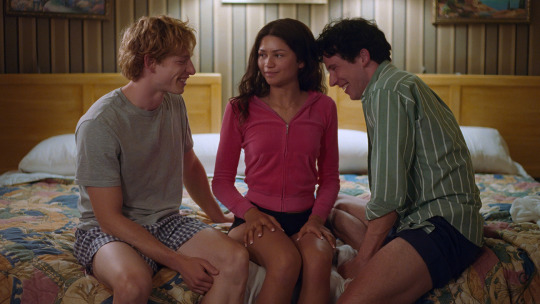
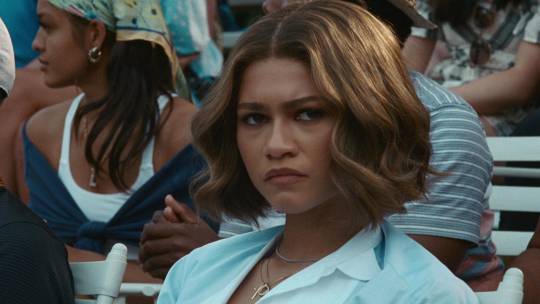
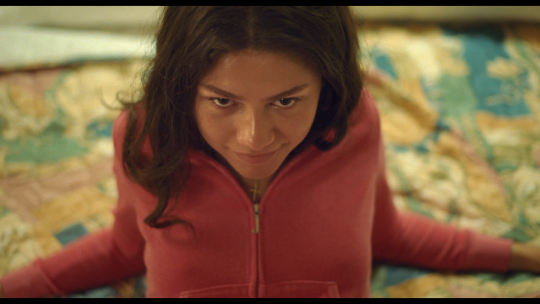
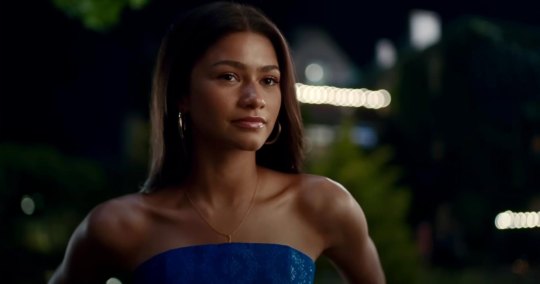
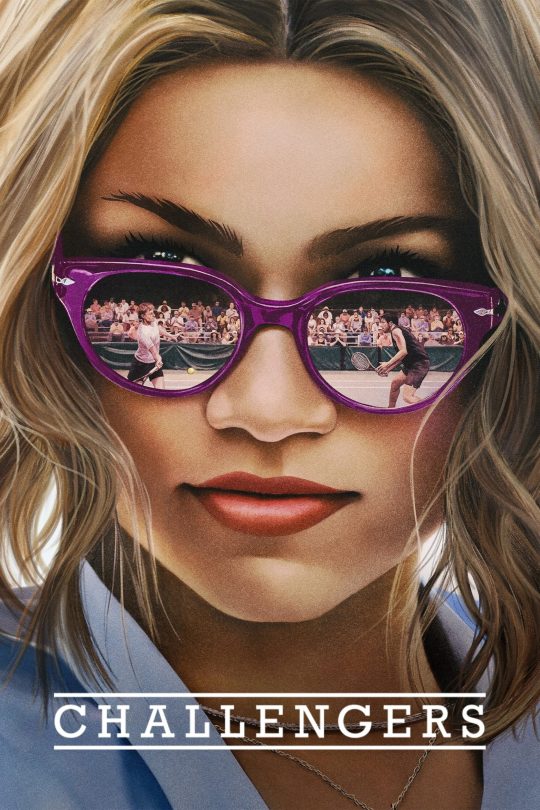
Challengers (2024) | A review w/ spoilers*
Tumblr is not going to like my review, I already know. I acknowledge this movie wasn't made for me, but I feel I give credit where it's due.
Last night I had a staggering movie going experience. I felt like I was being sold a lie a minute sitting through the agonizing commercials, the movie previews, and till the end of Challengers. Back to back promos for military branches, painting them as organizations of peace and innovation (a rally during war time). I understand there’s nothing new about that experience. Consumerism and propaganda tactics have a long tradition at the cinema. We’ve been advertised a false reality for so long it’s hard to think about our world without using the images fed to us to line that canvas. Take how modern horror treats rural living. It’s very common to see (in fact I saw) a movie trailer where a young couple vacations in a secluded part of the country to get away from it all. The idea of ruralism as a peaceful alternative to stressful urban living is benign and actually has some merit to think about in a country as urbanized and unhappy as ours. Yet the common movie trope is that there are evil forces lurking in the dark outskirts, that living ‘out there’ turns people into kooks or murderous cultists. One movie by itself with this premise can be harmless, but within a whole genre that trends this way it feels insidious. Almost like we are supposed to all fear each other. Challengers is another example of a genre movie that warps human reality into a lifeless opportunity to sell things.
When a movie feels more like a commercial or a music video then why even bother with the movie going experience. The distinguishers between television and film are fading away over time. In one particularly unabashed scene we cut between three different product placements for Coke, Adidas, and the U.S. Open. It was shameless, the way Josh O’Connor was most likely told to hold that CocaCola label perfectly centered in the frame. Those three brands are far from the only ones displayed. Tennis, and sports events in general, flash a ton of advertising so I understand that the film’s stuck in that universe. Still there are ways to artfully sidestep brazen product placement.
I don’t want to spend much time trying to analyze the relationship between Tashi, Art and Patrick. The film doesn’t give you enough about why these three are fatefully attached to each other besides vapid attractions. Yes all three are enamored by one another but what’s the motivation to stay in this toxic ménage à trois dynamic for so long? Zendaya plays Tashi, a master manipulator trying to mold her husband Art Donaldson into the star tennis player she was supposed to be before her injury. And her “little white boys” Art and Patrick feel like pawns that are content to be pawns. Men who don’t have any freewill and are solely motivated by their lust for this supermodel of a woman. In a way I don’t blame them. My disconnect comes because there’s a lack of depth with the characters and their relationships. Each of them seems to have a singular focus; Tashi wants vicarious glory through Art, Art wants to be loved, and Patrick wants Art’s life. But there is no depth to the desires. Time is never spent on why Tashi loves tennis more than people or why Art and Pat let their, supposedly strong bond, get broken so easily by a “home wrecker” that forecasted her own home wrecking. And look, as a seductive art piece it succeeds, for the most part, but as a story about real people it reduces its characters to their base desires while pretending they are complex. Maybe I don’t understand Romance—as I’ve been told. I am content to treat it as just a romantic fantasy and give it credit for being hot, but it was also a long drawn out tease.
There was no reason for this experience to be more than two hours long! Half of it was in never ending slow-mo where I felt like the same tennis ball was being served for half an hour. The dreaded slow motion, which can be good for a sporty movie to capture athletic movements and build suspense, but here it was overused to a point where it left us thinking “get on with it already”. Thank goodness some of my theater neighbors were also moaning about this because I felt alone, trapped in a drugged fugue state. So much of the film was disorienting. For a period you are meant to feel like a tennis ball being battered around through the camera. Editing wise this movie had the same problem that so many modern movies have; death from a thousand cuts. And the slowly unraveling chopped timeline executed so many arbitrary flashbacks and flash forwards. Eight weeks before, two days forward, then a five year flashback, all when you could tell this story sequentially with similar suspense building and less confusion.
Seeing this movie was a spur of the moment, going in blind experience. I know now that I was not the target audience. Today I mentioned it to a friend and he ended up watching the trailer. The text I got back: “looked like a bit of a teenager movie”. I don’t mean to spoil the enjoyment for anyone with this review. From a certain angle I did have fun with Challengers. Sometimes simply devouring some eye candy is what the mood demands.
If you found my writing at all interesting please visit and follow it on Substack!
#movie review#movies#film#movie poster#film review#zendaya#zenday coleman#josh o'connor#mike faist#luca guadagnino#challengers#challengers 2024#romance#tennis#propaganda#anthrotographer
11 notes
·
View notes
Text

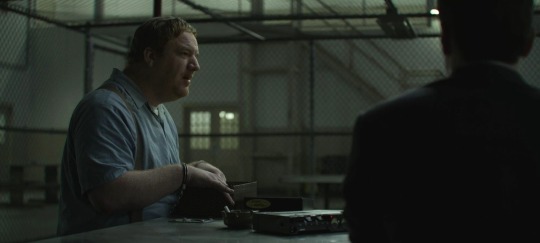
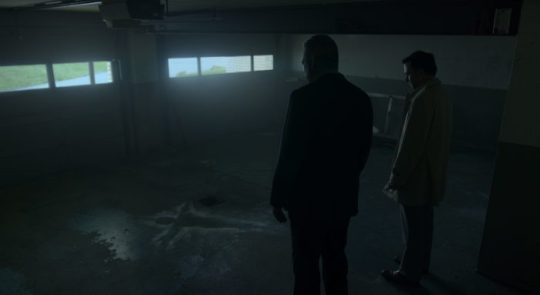
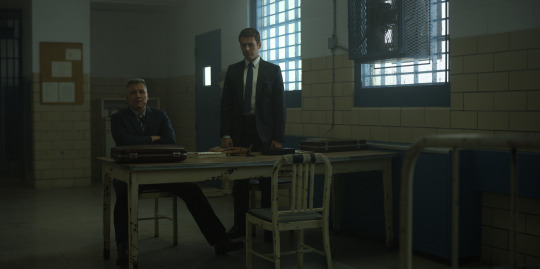
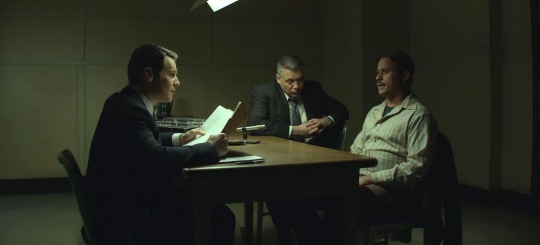
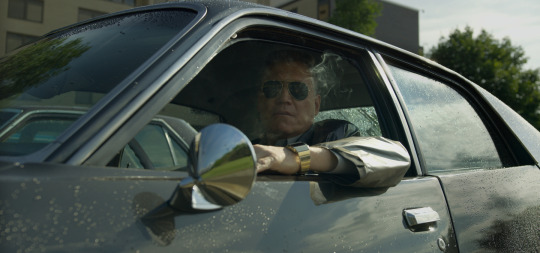
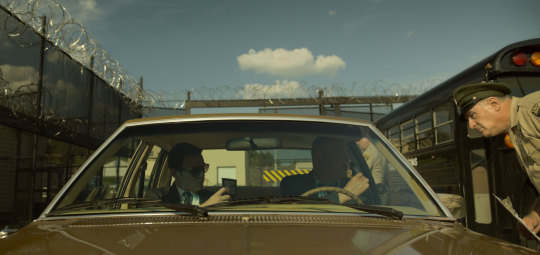
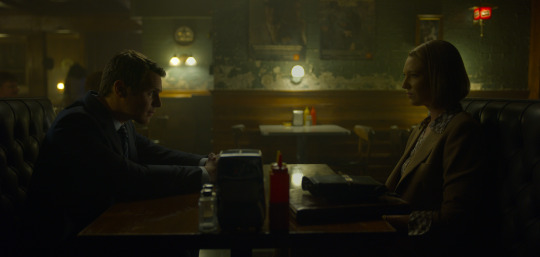
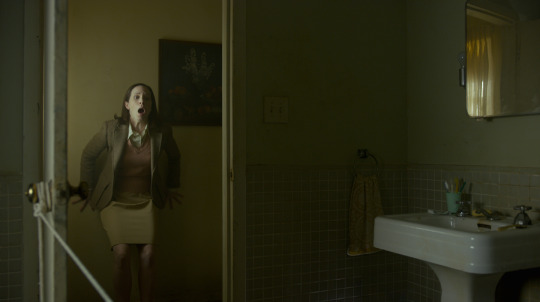
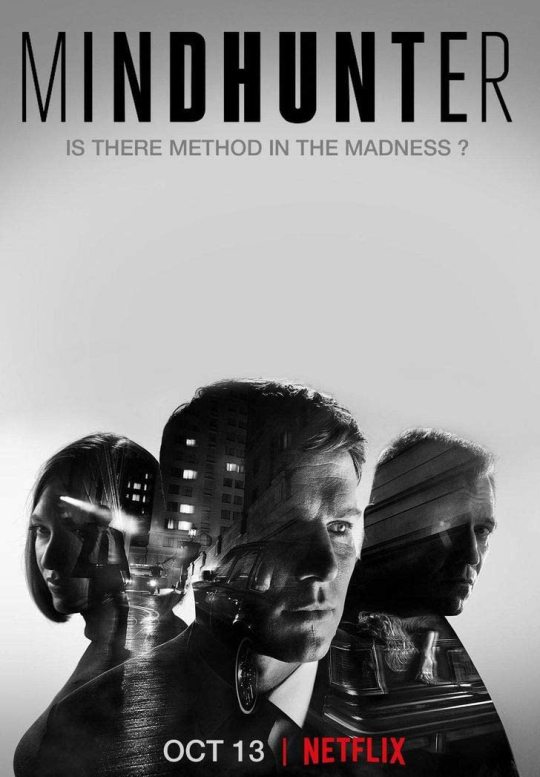
Mindhunter (2017)
Mindhunter is one of the best shows Netflix has ever put out. What sets it apart is its focus on human psychology, both criminal and civilian. Our FBI agent protagonists Bill and Holden try to scour the minds of serial killers through in depth interviews to better understand what made them kill. What led a human being into becoming what society deems a monster? The show and these interviews within it make you see the grey where society sees the black and white. These men (because they are mostly men) grew up usually with terrible upbringings that warped their world views and sent them onto dark paths. Not to say some wouldn't have become killers without the bad upbringings, because I believe sometimes its just somebody's wiring that sets them up for failure. The old 'nature vs. nurture' debate and which has more power inside of us. The phrase should be 'nature and nurture', because science says that we are all shaped by both. Mindhunter details that it's probably a bit of both too. The premise of the show is summed up best by sasisami on IMDB "Two FBI agents, fighting the departmental stigma of backroom boys - those who try to complicate the status quo of simple Means, Motive, Opportunity (MMO) of crime-solving with academics - work to develop an innovative investigative field incorporating psychology, anthropology and sociology as a method to reveal the motive. They acknowledge classic crime-solving - MMO - as no longer sufficient because criminality is becoming more complicated as Motive graduates from need and greed to inexplicable and irrational reasons. They theorize applying deeper psychological evaluation will posit new questions. Simply, asking Why will lead to the Who. This series focuses on the development by two men, two agents, of a new criminal field and does so through story lines of visiting the sociopathic mind." Agents Holden Ford and Bill Tench team up with psychologist Dr. Wendy Carr to start this Behavioral Science Unit. I love the way they portray the inception of the unit. All three are willing to take this huge career risk because of genuine curiosity and a belief that this new work can benefit society. Sure some are skeptical, mostly Bill Tench, but that doesn't dissuade them from doing the work. A lesser show would have more trivial storylines where the characters waste time fighting the objective or fighting each other, but the show focus's more on genuine dramas within the characters; like how their taxing work messes with their minds. Holden has panic attacks, Tench lets his family life suffer, and Carr well, she's relatively unfazed... for now. I predict she will have more to deal with when Season 3 eventually gets dropped (heres hoping).
Whats more, the show doesn't overly demonize these serial killers. There's no over-sensationalizing. It's because we get to see what shaped them; abusive families, absent parents, failure of support systems. You can't help but sympathize just a little. That's not every case though. Some of them are just as interesting because you see how inhuman a human can be. And partly why Mindhunter gives off such strong feelings is due to the amazing performances throughout.
The attention to detail in all aspects of making the show is what takes it from good to excellent. The casting is perfect whether it be for the main characters or the killers themselves. The slow striking score really sets the mood every time. An original score for a show always tends to give it that much more identity. Lighting, costume & set design, editing, everything. It made me decide that the next movie I watch has to be by David Fincher.
Rating: 9/10
#mindhunter#crime drama#movie review#movies#film photography#film#movie poster#film review#screenshots#murder#violent crime#homicide#cops#david fincher#anthrotographer#tv show review#Joe penhall#jonathan groff#anna torv#holt mccallany#hannah grose#serial killer#charles manson#edmund kemper#1970s#fbi
8 notes
·
View notes
Text


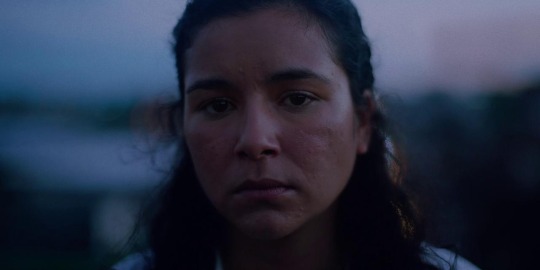
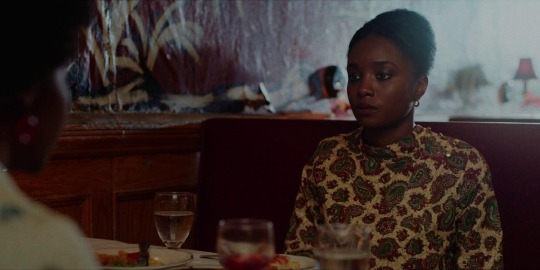
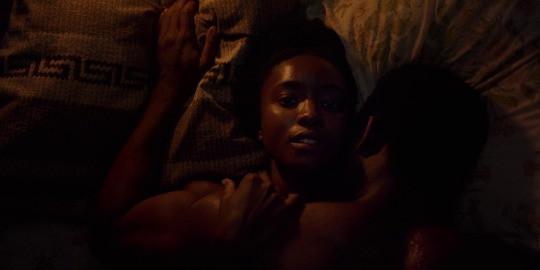

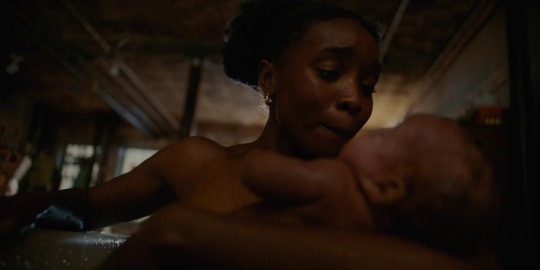


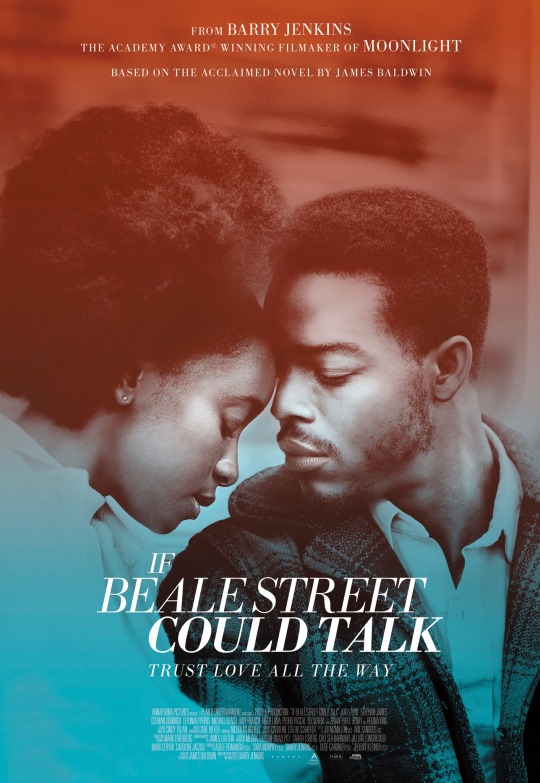
If Beale Street Could Talk (2018)
Thoughts on the film and novel. I read it before I saw it.
It's a different type of love story, one where the love is absolute. Usually you have a love story where one or more of the characters have to question "is this the one for me"? There is no room to question Tish and Fonny's love for each other. They have truly loved each other since they were kids. The real drama in the story is whether the world is gonna love them back and let them be together. Whether they'll get lucky or not, because it takes luck not to get fucked over by a system that excludes you. Will the racist, white-dominated society ever let up; and if not accept their existence, then at least be uninvolved/unaroused by it? No, they are aroused by it. The white men depicted in the film are just a reflection of reality in 1970s America and present-day. Their superiority complex is so baked into them by historical coincidence that many of them can't sit still nonviolently if a black person comes into their line of sight. And that's exactly the situation Fonny has to deal with in If Beale Street Could Talk. He was arrested by a white cop for a crime that he didn't commit, all because of his actual offense; walking home while black. It is as simple and cold as that. This might be James Baldwin's fictitious story but it's informed by a well sourced history of black oppression.
The big dilemma in the story is Fonny's imprisonment. To make matters more dire Tish informs her love that she is pregnant during one of her first visits at Fonny's jail. As stated before he was just minding his business one night when a cop decided Fonny fit the description for a suspect in a recent rape case. A young Puerto Rican woman was the victim of this heinous crime, but since it happened in the dead of night she didn't get a good look at who did it. The police department rounded up guys off the street and convinced young Victoria that Fonny was the one who did it. Part of the tragedy of Beale Street is the state pitting these two persecuted minorities against each other. The state has no 'real' proof to link Fonny to the crime. Unfortunately, as Tish's sister puts it in the book "We have to disprove the state's case. There's no point in saying that we have to make them prove it, because, as far as they're concerned, the accusation is the proof." Guilty until proven innocent. James Baldwin would probably be depressed but not surprised to find out not much has changed about the justice system in America.
What I find most gripping is the realness of the characters. Not just the young adults Tish & Fonny, but their families too. Tish's family has a crude vocabulary and domineering attitude towards anyone not in their corner. They, like many in their community, are jaded by the world they grew up in. They are just finding ways to cope and not explode. Not explode just for their families sake. For Fonny and the baby's sake. They love one another and to them that means speaking uncomfortable truths, like holding no punches when talking about the sins of white people. And sins not in the religious sense because their family justifiably has lost faith in any grand fairness that religions so often preach. Fonny's biological 'family' on the other hand drinks the Christian cool-aid hard. Well his mother and sisters do. They don't see Fonny's incarceration as an injustice, but as a consequence of his impurity. Impurity of having a child so young, marrying so young, not being pious enough, etc etc. The only family member that truly supports him is his father Frank. Baldwin is showing us through his characters that we're all imperfect. We are products of our circumstances and environment, like the wood Fonny crafts into sculptures. What perfect symbolism by Baldwin.
The innocence of this couple's love is something that really comes through in both the screen and the original novel. I did feel the film relied too heavily on its long silent stares between the protagonists. They're meant to evoke a love that is so powerful it needs no words, but after a while these scenes get too tedious and uninteresting. I think the film adaptation kept close to Baldwin's work though, but since I inevitably compare it to the novel I just feel it came short of being as powerful. Part of it could be just simply that this is James Baldwin’s story, not the director Barry Jenkins' original work (Like Moonlight was, and which I think is a 10 of 10 film). There was however one semi-big detail the film didn't adapt, and that's the presumed suicide of Fonny's father at the end of the drama. In my opinion that omission is very significant. It softens the power of the story. A thought I think now that describes the film overall. Jenkins himself hints at at in an interview with IndieWire that his film was more about the love story. I think Baldwin's original story is about hurt, hurt, and more hurt with love trying to survive it all. And Fonny's father committing suicide after facing the fact that his son is not getting out of prison is a crucial moment of that hurt. Baldwin obviously thought it was crucial because it’s literally the last thing that happens in the book. Presumably Baldwin's final reminder that historically a black life in America never really gets a happy ending.
P.S. My comments ended up being more on the book than the movie because at the moment that I'm writing this I recall the book more.
Also I thought the soundtrack was great and stood out as one of the best things about it.
https://www.indiewire.com/2018/11/if-beale-street-could-talk-barry-jenkins-james-baldwin-1202023517/
Rating: 6/10 (Just the film)
#anthrotographer#movie review#movies#film photography#film#movie poster#film review#screenshots#if beale street could talk#james baldwin#1970s#black film#based on novel#books and novels#black history#book vs movie#kiki layne#stephan james#regina king#nicholas britell#film music#fonny#tish
8 notes
·
View notes
Video
youtube
Waves of Anemoia
This video was inspired by the song 'Wheel' by Mk.gee. The song creates a feeling of nostalgia and gives off fun, mellow, and beachy vibes. You get a sense of a time long past, and that is where we arrive at the word 'Anemoia'.
'Anemoia' - nostalgia for a time one never lived in.
Making this was also good editing practice. There was an attempt to match beats in the song with the cuts and different actions in the clips. The sources for the clips were from lots of old camcorder and Super 8 films uploaded online (ranging from the 1920s -1980s).
#barbosafilm#the anthrotographer#anthrotographer#mk.gee#indie music#beach#beach vibes#camcorder footage#super 8#mellow#nostalgic#nostalgia#anemoia#surfing#surf#editing#filmedit#video editing
1 note
·
View note
Video
youtube
'Waltz with Bashir': The Ultimate Anti-War Film
Video essay on the 2008 animated film 'Waltz with Bashir'. This film by Israeli director Ari Folman blurs the lines between animation, documentary, satire, and historical. With it's attention to truth of war times, it stands out as a prominent piece of anti-war sentiment.
#barbosafilm#the anthrotographer#anthrotographer#waltz with bashir#video essay#anti-war movies#antiwar#animation#adult animation#Ari Folman#documentary
1 note
·
View note
Video
youtube
1. Lifestyles of the Niche & Anonymous
Presenting a new 'docu-series' I/we made about highlighting the uniqueness of everyday people. We focus so much in our society about the lifestyles of the rich & famous, that we tend to devalue the lifestyles of the niche & anonymous. In the 1st installment we meet Nick; a traveler, thinker, life fulfiller who permits a few questions outdoors.
Music: 'Ken The Wolf Boy' by Mac Demarco
This is something I/we are going to be working on in tandem with still putting up barbosafilm reviews :)
#barbosafilm#the anthrotographer#anthrotographer#docu-series#docuseries#series#everyday people#LOTN&A#lifestyle#interview#mac demarco#ken the wolf boy
0 notes